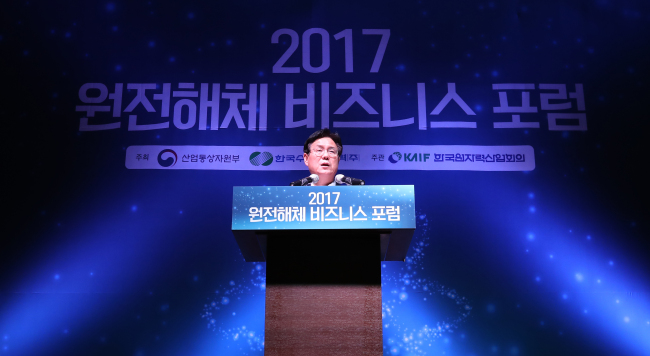KHNP seeks to lead nuclear decommissioning industry
By Shim Woo-hyunPublished : Dec. 10, 2017 - 17:13
The Korea Hydro & Nuclear Power, the nation‘s nuclear reactors operator, plans to ramp up efforts to develop technologies related to nuclear decommissioning, to lead the market here and abroad, the company said Sunday.
The announcement was delivered at a launching ceremony of a consultative body on reactor decommission held Friday amid Moon Jae-in government‘s drive on decreasing the nation‘s reliance on nuclear energy. Taking the state drive as well as changing policies around the world toward nuclear power as opportunities, KHNP is hoping to enter the global nuclear decommissioning service market.
To secure safe and cost-effective technologies for reactor decommissioning, Lee Kwan-sup, CEO and president of the KHNP, urged experts and officials from both the private and the public sector on nuclear energy to work together.
The announcement was delivered at a launching ceremony of a consultative body on reactor decommission held Friday amid Moon Jae-in government‘s drive on decreasing the nation‘s reliance on nuclear energy. Taking the state drive as well as changing policies around the world toward nuclear power as opportunities, KHNP is hoping to enter the global nuclear decommissioning service market.
To secure safe and cost-effective technologies for reactor decommissioning, Lee Kwan-sup, CEO and president of the KHNP, urged experts and officials from both the private and the public sector on nuclear energy to work together.

”(To nurture) the reactor decommissioning industry that is based on safety-first (policy) and cost-efficient, businesses including KHNP, academia and research institutions have to form various networks to share information and technology,“ said Lee, named to lead the newly launched body with nuclear engineering professor Lee Byung-sik Lee of Dankook University.
Together with the KHNP, the Ministry of Trade, Industry and Energy plans to secure core technologies required to decommission Kori-1 nuclear reactors by 2021, said Park Won-ju, a ministry official in charge of the energy policy, during the seminar. The government plans to establish a research center by 2021 to support the local companies to enter the global nuclear decommissioning market in the 2030s, Park added.
The KHNP is currently in charge of the decommissioning of the Kori-1 nuclear unit, which was shut down in June after 40 years of commercial operation and currently taking steps accordingly.
The state-run nuclear operator said that the company has currently secured 39 nuclear decommissioning technologies, out of 56 technologies required to dismantle the unit, and the rest is on track for development. The KHNP will also prepare in building 11 new pieces of equipment needed to decommission the nuclear unit, it also said.
To acquire the required technologies, the KHNP has been seeking new partnerships with companies abroad.
Last month, the KHNP signed separate memorandum of understandings with the state-controlled Electricity of France and nuclear company Areva to boost cooperation in the energy sector and nuclear decommissioning process.
Earlier this year, the KHNP also agreed to work together with the Spanish government-led Enresa and the UK’s Nuclear Decommissioning Authority, to enhance cooperation in the area.
In Korea, a total of 11 nuclear reactors are to end their operating lifetimes by 2030 as the government previously said that it will not provide lifetime extensions. In line with its nuclear phase-out plan, the government is currently mulling over options to shut down Wolsong-1, now the nation’s oldest operating reactor, as soon as possible.
While preparing for the decommissioning of the local nuclear reactors, the KHNP also strives to obtain its footing in the global nuclear decommissioning service market, which is forecast to grow.
According to the KHNP, some 76 nuclear reactors around the globe will face retirement during the period between 2015 and 2019, followed by 183 units in the 2020s, 127 units in the 2030s and 89 units in the 2040s.
The size of the global nuclear decommissioning market is expected to pass well over some 400 trillion won ($366 billion) in the future, according to industry sources and data.
By Shim Woo-hyun (ws@heraldcorp.com)








![[Graphic News] More Koreans say they plan long-distance trips this year](http://res.heraldm.com/phpwas/restmb_idxmake.php?idx=644&simg=/content/image/2024/04/17/20240417050828_0.gif&u=)
![[KH Explains] Hyundai's full hybrid edge to pay off amid slow transition to pure EVs](http://res.heraldm.com/phpwas/restmb_idxmake.php?idx=644&simg=/content/image/2024/04/18/20240418050645_0.jpg&u=20240419100350)






![[From the Scene] Monks, Buddhists hail return of remains of Buddhas](http://res.heraldm.com/phpwas/restmb_idxmake.php?idx=652&simg=/content/image/2024/04/19/20240419050617_0.jpg&u=20240419175937)

![[KH Explains] Hyundai's full hybrid edge to pay off amid slow transition to pure EVs](http://res.heraldm.com/phpwas/restmb_idxmake.php?idx=652&simg=/content/image/2024/04/18/20240418050645_0.jpg&u=20240419100350)

![[Today’s K-pop] Illit drops debut single remix](http://res.heraldm.com/phpwas/restmb_idxmake.php?idx=642&simg=/content/image/2024/04/19/20240419050612_0.jpg&u=)